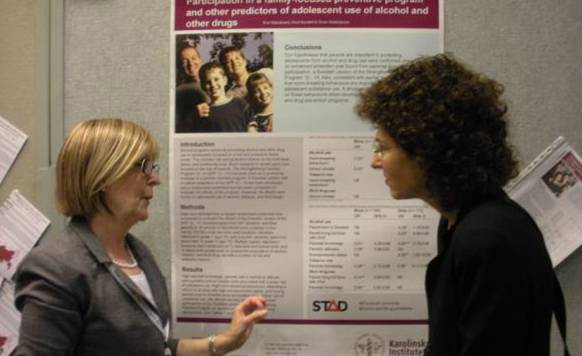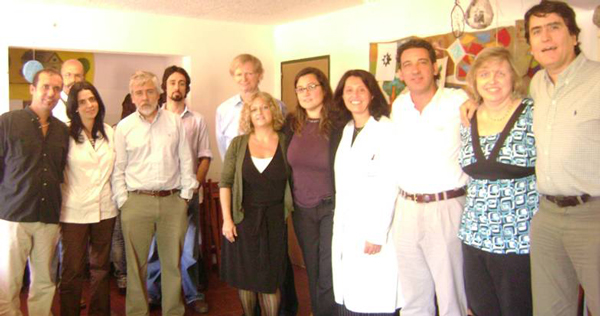The National Institute on Drug Abuse (NIDA) International Program is pleased to announce the selection of the 2011 Awards of Excellence winners, who are recognized for their outstanding contributions to international cooperation in drug abuse research and training.

NIDA Awards of Excellence recipients Richard Rawson (left), María Elena Medina-Mora Icaza, and Jeffrey Samet (far right) with NIDA International Program Director Steven W. Gust.
"The Awards of Excellence winners are dedicated and experienced leaders in the international effort to advance drug abuse research and training," said Steven W. Gust, Ph.D., director of the NIDA International Program. "This year's winners have helped to prepare international scientists to work together across political borders, to lead the way for key scientific breakthroughs, and to develop collaborative partnerships to support international research."
The 2011 Awards of Excellence winners were announced June 18, 2011, at the NIDA International Forum in Hollywood, Florida. The 2011 Forum focused on "Building International Collaborative Research on Drug Abuse," acknowledging the importance of individuals from diverse settings working together to address drug abuse and shape drug abuse policy.
The awards are presented each June at the NIDA International Forum.
Awards of Excellence winners are selected based on contributions to three areas essential to the mission of the NIDA International Program: mentoring, international leadership and collaborative research.
The 2011 Awards of Excellence winners are:
Richard A. Rawson, Ph.D., University of California, Los Angeles, was honored for his leadership in the area of collaborative research, working to narrow the divide between research and practice around the world. He has led addiction research and training projects for the United Nations, the World Health Organization, and the U.S. State Department, exporting science-based knowledge to many parts of the world. During the past decade, he has worked with the U.S. State Department on large substance abuse research and treatment projects, disseminating U.S. technology and addiction science to Egypt, Israel, Mexico, the Palestinian Territories, South Africa, and Thailand. He and his colleagues in the Middle East—Drs. Richard Isralowitz (Israel), Mohammed Al-Afifi (Palestinian Territories), and Tarak Gawad (Egypt)—have engaged international experts to develop a process to promote communications, cooperation, and coordination of efforts directed toward the prevention and treatment of drug abuse in the region. Dr. Rawson also directs the capacity-building and training component of the United Nations Office on Drugs and Crime, the International Network of Drug Treatment and Rehabilitation Resource Centres (TreatNet), a global initiative to address the need for accessible and quality drug treatment.
María-Elena Medina-Mora Icaza, Ph.D., Instituto Nacional de Psiquiatria Ramón de la Fuente, Mexico, was recognized for international leadership in documenting drug abuse and developing, implementing, and evaluating science-based demand-reduction strategies. She is a leader in United States and Mexico cooperation, having played an active role in the 2010 U.S.–Mexico joint declaration on demand reduction and in recent collaborative initiatives between the U.S. State Department and Mexico to establish a clinical research capability. An internationally recognized epidemiologist, Dr. Medina-Mora has been a member of the World Health Organization Expert Committee on Addictions since 1986 and she has worked tirelessly to standardize drug use reporting across countries and cultures. She has served on the boards of numerous national, regional, and international organizations and publications, among them the International Narcotics Control Board and the Inter-American Drug Abuse Control Commission Scientific Advisory Committee. Dr. Medina-Mora is also a talented teacher and administrator whose students and colleagues successfully follow her example in contributing to the international drug abuse research community.
Jeffrey H. Samet, M.D., Boston University School of Medicine, was recognized for his commitment to mentoring junior scientists and physicians in their pursuit of patient-focused drug abuse research and treatment. Whether mentoring a promising young scientist or an established academic researcher, Dr. Samet's commitment to and investment in guiding scientists in their pursuits in drug abuse-related patient-oriented research is unfaltering. His approachable and enthusiastic style and his ability to tap into researchers' potential have made him an in-demand mentor within the drug abuse research community. He has influenced the careers of innumerable young researchers both in the United States and abroad, particularly in Russia, where he has trained and inspired several junior investigators and is currently a co-principal investigator of a study on HIV and substance abuse in the region. In the United States, he created the NIDA-supported Chief Resident Immersion Training program, a 4-day immersion training for incoming chief residents and their faculty mentors on state-of-the-art methods to diagnose, manage, and teach about substance use disorders. More recently, he is working on another NIDA-funded study to advance the Clinical Addiction Research and Education program, which has successfully fostered physician development in addiction research and education during the past 5 years. Both programs will provide easily adaptable models for the international drug abuse community.
Each year, the NIDA International Program welcomes Awards of Excellence nominations from any individual or organization. Nominations should be accompanied by a detailed written description of the accomplishments of the nominee and an explanation of why those accomplishments merit the NIDA International Program Award of Excellence. Additional information is available at http://international.drugabuse.gov/meetings/international-forum/awards-excellence.





.png)


